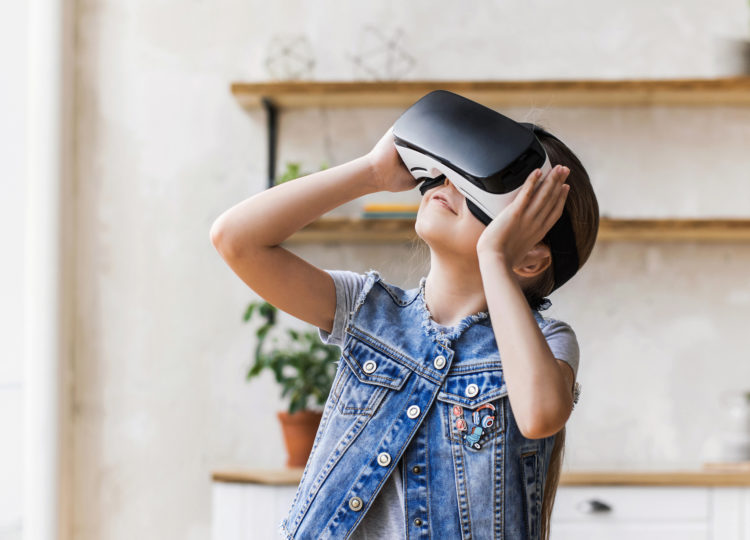
For children with autism spectrum disorders, both verbal and non-verbal communication can be a challenge. Therapists, counselors, teachers, and parents continually strive to help children with ASD better connect with others, and to understand what living with ASD is like. One tool that’s helping people reach these goals is virtual reality. In fact, some experts believe that virtual reality is the best tool available for helping people put themselves into someone else’s shoes.
Using VR in the context of autism spectrum disorder is not a new idea: autism therapists and researchers have been using virtual reality since the mid-1990s. Researchers have used virtual reality technology to help people with ASD prepare for stressful encounters and situations, like job interviews, conflicts, and even dating. For children with ASD, virtual reality has been used to help prepare them for public speaking. Using a game in which a room full of avatars could only be kept from fading away through eye contact, children learned to look around the room, instead of just looking straight ahead.
One issue that impacts children with autism spectrum disorders is phobias. Some common phobias include fear of public transport, classrooms, balloons, and animals. Cognitive-behavioral therapy has been used to combat these phobias, but some kids with ASD struggle to achieve the visualization and imagination that’s necessary for this therapy to be fully beneficial. Recently, however, a study examined the effect of immersive therapy to address phobias in children with ASD. The study involved a randomized, controlled trial of 32 children between the ages of 8 and 14, and the results indicated that 25 percent of the group experienced an alleviation of their phobias two weeks after the end of the treatment. By six months after the end of the trial, that number had gone up to 38 percent.
Virtual reality has been successful in helping people with ASD practice social skills and overcome phobias, but it has additional implications for autism spectrum disorder as well. People with ASD are using VR to help share their own experiences, in a variety of ways. One example of this is a project called Beholder, created by Matt Clark, the founder of United Visual Artists. The father of a teenager with autism spectrum disorder, Clark wanted to create something in collaboration with high functioning artists with ASD that would allow neurotypical people to see the world from the perspective of an autistic child, celebrating some of the truly interesting aspects of this kind of perception.
Other projects focus on creating experiences that allow family members of people with ASD and others who want to understand the condition to experience how it feels to have autism spectrum disorder, as well as certain other neurodivergent conditions like dyspraxia, dyslexia, and ADHD. The goal of these types of simulations is not just to raise awareness of the challenges these individuals faced, but also to give a glimpse into a world that many of us struggle to understand. There’s hope that as VR technology continues to improve, it will play an increasingly significant role in how we support those with ASD, helping them connect, communicate, and navigate the world around them.
For over 20 years, The Behavior Exchange in Plano and Frisco, Texas has been helping children with autism spectrum disorders, behavioral issues, developmental delays, and other special needs to reach their full potential. Our staff is dedicated to helping children achieve their goals, and with the help of families, schools, and other professionals, we apply the patience, focus, expertise, and time that it takes to improve behavioral difficulties. Our goal is to turn every family into a happy family, turn children into successful individuals, help parents to feel empowered, and increase the effectiveness of schools. Providing individualized, early-start therapy, and educational programs for children of all ages, we offer ABA therapy that’s personalized to meet each child’s unique needs. For more information about how we can improve your child’s life and yours, call 972.755.3802, or contact us through our website.
